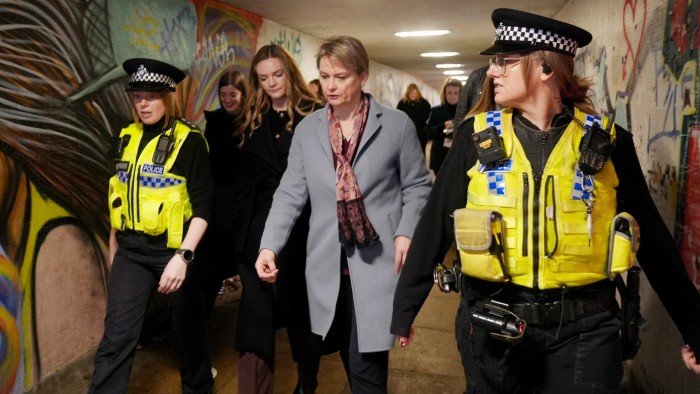Unlock the Editor’s Digest for free
Roula Khalaf, Editor of the FT, selects her favourite stories in this weekly newsletter.
The Treasury is closing in on a funding settlement for the police after a tense stand-off with the Home Office, in the final days of talks between Rachel Reeves and other ministers ahead of next week’s spending review, which will set out government expenditure for the next three years.
The finance ministry has offered a frontloaded settlement under which there would be relatively more money upfront but tighter limits in the second and third years, according to people close to the discussions.
But Yvette Cooper, home secretary, has privately held out, arguing that the offer was inadequate for meeting Labour’s crime-fighting promises.
“The suggestion is that more money might be forthcoming later in the parliament to top the budget,” said one person briefed on the negotiations.
The chancellor will on Wednesday announce the conclusion of the spending review, which will set day-to-day spending totals until 2029 and capital budgets until 2030 for all government departments.
Reeves’ statement in the House of Commons will mark the first spending review by a Labour government in 16 years.
Yvette Cooper, home secretary, has been among a handful of holdouts still negotiating the terms of her department’s settlement along with Angela Rayner, secretary of state for communities, housing and local government.
Rayner, who is also deputy prime minister, is expected to secure a generous package of capital funding for social housing but has for days been reluctant to sign off the Treasury’s offer for local government spending.
Councils have for months warned that their ability to deliver services such as social care and ensure children gain access to special educational needs provision will be hit without a generous settlement from Reeves.
People briefed on Cooper’s negotiations with the Treasury say the talks have been fractious, with irritation in the finance ministry over public interventions by police chiefs demanding more money.
A “bilateral” meeting between Cooper and Reeves on May 28 went “poorly”, according to people familiar with the matter. On the same day, Sir Mark Rowley, Metropolitan Police commissioner, told the BBC that Labour’s manifesto pledge to make streets safer was unlikely to be met without greater funding.
Treasury officials dislike such public interventions — known inside government as “bleeding stumps” — while Cooper still believes that Reeves’ offer to her department will not give the police the money they need to deliver on Labour’s promised crime-cutting “mission”.
The Treasury and the Home Office did not immediately comment.
The squabbling inside Whitehall ahead of the spending review comes despite Reeves having loosened fiscal rules on capital spending in last autumn’s Budget.
The move will allow her to distribute £113bn over the rest of the parliament for roads, railways, green energy and other infrastructure projects, with extra weight given to schemes that improve productivity in areas including the north and Midlands.
Ministers are next week expected to set out details of funding for a new railway line between Manchester and Liverpool.
Meanwhile, Reeves’ team have said she will also spend £190bn more on day-to-day spending over the five-year parliament than the Conservatives had planned. Her October Budget increased taxes by £40bn a year and added an average £28bn of borrowing every year over the parliament.
Yet some departments are facing a squeeze in day-to-day spending because “protected” areas such as health, education, defence and pensions are receiving more generous expenditure.

